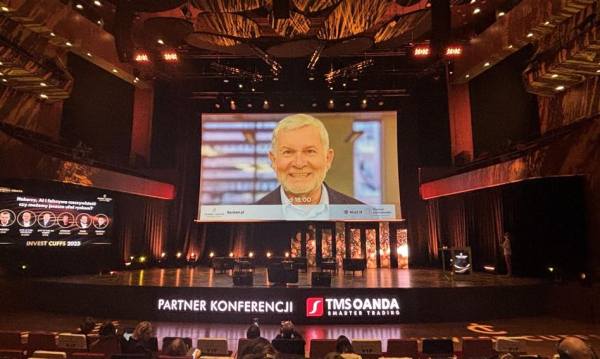An extraordinary event took place during the Invest Cuffs conference. Renowned academic professor Krzysztof Jajuga announced the issuance of his own tokens “jajugacoin” worth $2 billion… Except that the presented recording turned out to be a deepfake and an introduction to a discussion on the impact of artificial intelligence on the security of financial markets.

“Ladies and gentlemen, in view of the growing popularity of cryptocurrencies in the world and the support of this asset by President Trump himself, I have decided to issue my own currency, jajugacoin. The value of the issue, which has just started, is approximately two billion dollars. Generally, first come, first served. I see great interest, especially from investors from Asia. There is a special 50% discount for participants of the Invest Cuffs conference, only until March 29, 6:00 p.m. We invite you to participate,” announced Prof. Krzysztof Jajuga from the screen of the main hall of the ICE Congress Center in Krakow.
The situation was immediately explained by the moderator of the debate, editor-in-chief of Bankier.pl Andrzej Stec, explaining that the entire recording had been generated by artificial intelligence. “This is just a sample of what artificial intelligence can do today. Tools that were fiction just a few years ago now allow you to create very realistic, fake materials,” Stec emphasized, opening the discussion on the consequences of advanced AI technology.
“Thank you for choosing me as an example. People who know me would find three reasons why I could not say such words,” commented Professor Yajuga, referring to the high-profile case of the manipulated speech of Ukrainian President Volodymyr Zelensky and emphasizing the seriousness of the threats associated with deepfake technology.
“This is the moment to stop trusting unconditionally what we see on our computer screens,” the professor added.
Beware of JajugaCoin! Professor’s Deepfake Warns of New Era of Fraud in Financial Markets
Would you believe a famous professor of economics if he encouraged you to invest in a new cryptocurrency? Invest Cuffs conference participants saw how easily public opinion can be manipulated today using advanced technologies, including the revolution associated with the development of AI.
Read more…
“The problem of identity manipulation is not new, but today, thanks to modern technologies, it is reaching a completely new scale,” warned Jarosław Grzywiński, president of NASK SA. He drew attention to the thousands of reports of identity theft that are sent daily to institutions such as NASK or the Central Bureau for Combating Cybercrime. “We will not escape this problem until we strongly focus on education and the development of security tools,” appealed Grzywiński .
Paweł Frańczak from the PFLAW Advocates & Partners law firm emphasized that the phenomenon of disinformation has a long history, but today AI allows for mass fraud. “Deepfake can be used as a weapon, including political, as we saw in the example of Cambridge Analytica’s activities. Technology always precedes law, and regulations are usually reactive, not preventive,” explained Frańczak, noting the need for rapid adaptation of legal systems. He also cited examples of AI being used in political campaigns, such as influencing the results of elections in the US and the referendum in the UK.
Among the topics raised during the debate was also the problem of asymmetry between global access to digital technologies and local restrictions on the part of legal regulations. “When people start losing money, that’s when they realize the seriousness of the risk. We need global standards of protection,” emphasized Professor Jajuga, citing the example of EU attempts to regulate AI, which, however, remain territorially limited and may be insufficient on a global scale.
Jarosław Grzywiński, however, noticed a positive aspect of Poland’s situation: “we are among the world leaders in terms of cybersecurity solutions. Poland, often the target of cyberattacks, had to develop advanced protection mechanisms,” said the president of NASK SA. Grzywiński pointed to the need to apply rigorous procedures, such as penetration tests, which should be a regular practice in every organization.
Robert Sitnik, representing Emplo City SA, emphasized the opportunities that AI technology brings, especially for Poland: “This is a huge opportunity for us, because it does not require a large industry, and it is based on the knowledge and skills that we already have.” Sitnik also drew attention to the need to develop digital competences among future employees and appealed for broad integration of AI solutions at universities and research institutions.
Referring to the role of AI in education, Professor Jajuga appealed for responsible use of technology by students, emphasizing that it is not enough to copy content generated by AI:
“You need to understand what you’re putting into your work. AI should help, but not replace your thinking.”
The professor also pointed out the risk that without appropriate education, young people may lose the ability to think independently and critically analyze information.
“We need to invest in digital education, strengthen regulations and further develop cybersecurity mechanisms to meet the challenges posed by the development of artificial intelligence,” concluded the debate, led by Andrzej Stec.


Bankier.pl